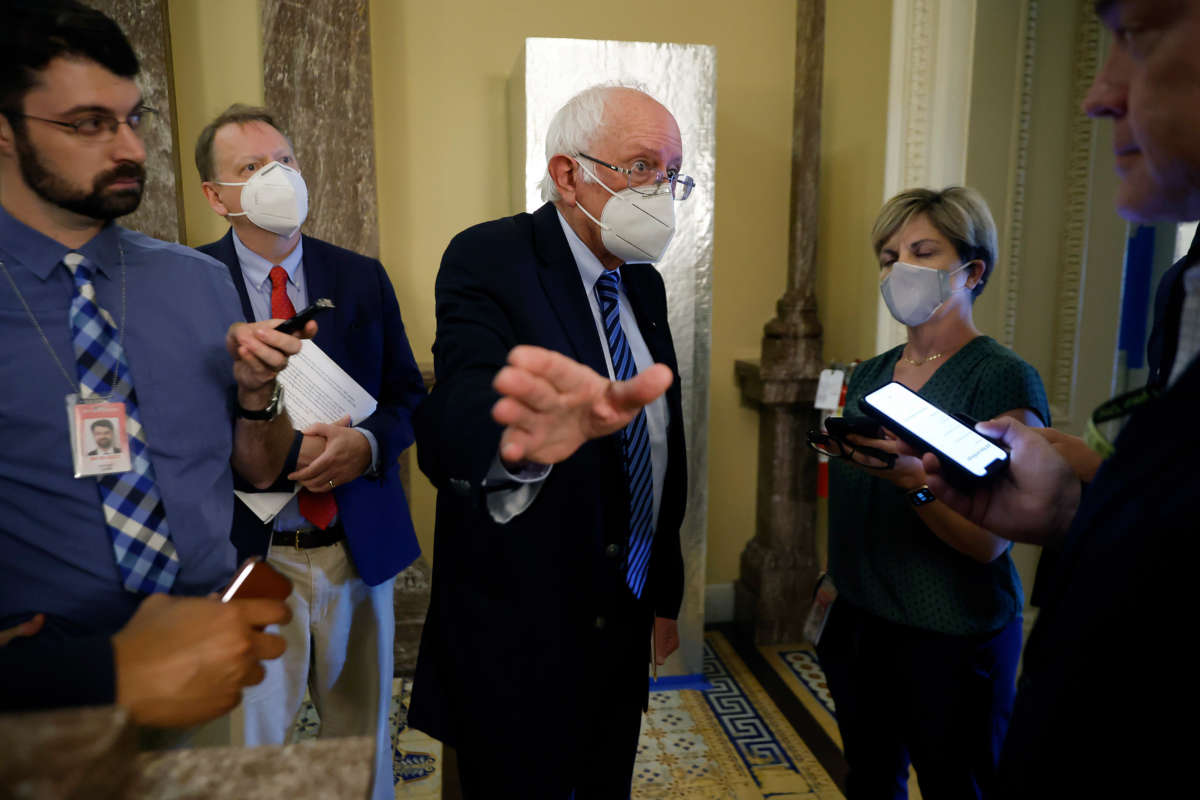In a speech on the Senate floor Monday, Sen. Bernie Sanders (I-Vermont) denounced Republican senators for saying that the U.S. should follow the lead of other countries on subsidizing the computer chips manufacturing industry, instead of on measures like universal health care.
As Sanders highlighted in his speech, recent reporting from The Associated Press found that Sen. Mitt Romney (R-Utah) and other Republicans believe that the U.S. should join other countries in giving large subsidies to chip manufacturers like Intel by passing the Senate’s $76 billion chips bill. The Vermont senator pointed out that these same lawmakers don’t believe that the U.S. should follow the lead of other countries when it comes to expanding the social safety net.
“Now I find the position of Senator Romney and others to be really quite interesting because I personally have been on this floor many many times urging the Senate to look to other countries around the world and learn from those countries,” Sanders said. “And what I have said is that it is a bit absurd that, here in the United States, we are the only major country on Earth not to guarantee health care to all of their people.”
He said that the U.S. should join countries like Germany, where higher education is largely free. The U.S. should also join every other wealthy country in the world in guaranteeing its workers paid family and medical leave, Sanders said — measures that he and Democratic lawmakers tried to pass in last year’s Build Back Better Act.
“Let’s join the club!” he exclaimed several times.
Republicans and conservative Democrats were uniformly opposed to provisions for paid family leave during last year’s Build Back Better Act negotiations, claiming that the federal deficit and excess government spending justified their opposition to the bill. But these same lawmakers seem to have no problem spending billions funding the corporate oligarchy in the U.S., Sanders said.
The real reason that lawmakers are so eager to pass the bill, the senator went on, is because computer chip manufacturers and lobbyists are compelling them to do so. “But I gather the problem is that to join those clubs — in terms of universal health care, in terms of paid family and medical leave, in terms of free tuition at public colleges and universities — we’re going to have to take on powerful special interests and they make campaign contributions, so that’s not what the Senate does,” he said.
He concluded by saying that, in addition to his concerns about corporate welfare, he is worried that the bill will set a precedent for companies to operate however they want without consequence. “What the precedent is is that any company who is prepared to go abroad, who has ignored the needs of the American people, will then say to Congress, ‘hey, if you want us to stay here, you better give us a handout,’” he said.
Sanders has continually spoken out against the Senate’s bill to provide $52 billion to chips manufacturers, which he says is tantamount to corporate welfare for major manufacturers. These manufacturers have made huge profits during the pandemic and paid their CEOs millions of dollars in compensation, profiting from a global chips shortage that has allowed companies to majorly hike their prices.
The bill cleared a key procedural hurdle in the Senate on Tuesday, setting it up for passage soon.
Last week, Sanders introduced an amendment to the legislation that would restrict the funds, ensuring that a company that accepts the subsidies cannot use the funds on stock buybacks, outsourcing jobs to other countries or union busting.
Media that fights fascism
Truthout is funded almost entirely by readers — that’s why we can speak truth to power and cut against the mainstream narrative. But independent journalists at Truthout face mounting political repression under Trump.
We rely on your support to survive McCarthyist censorship. Please make a tax-deductible one-time or monthly donation.
